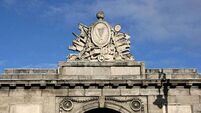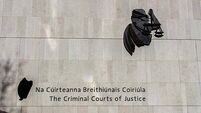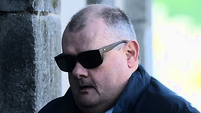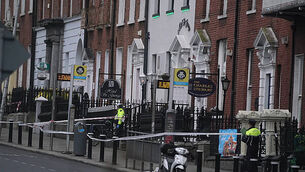‘Huge issue’ of trespassing and dog attacks discussed at Ploughing Championships
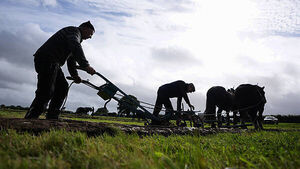
By Gráinne Ní Aodha, PA
Trespassing and dog attacks on livestock have become a “significant issue”, a farming organisation has said at the Ploughing Championships in Co Offaly.
The issue of high food prices was also highlighted as agricultural and rural groups gathered for the second day of what is Europe’s largest outdoor event.
Over 78,000 attended the first day of the agricultural exhibition, which is being held this year on over 800 acres of farmland in Screggan, Tullamore.
It is expected to attract up to a quarter of a million people, including the leading presidential candidates, ahead of the October 24 poll.
Various ploughing disciplines are being held on Wednesday, as well as loy digging, a welly throwing competition, a lamb shearing event, a breadbaking semi-final and farming discussions.
Horses, vintage tractors and hurley stalls were also on display.
Farm safety was also to the fore, with the Health and Safety Authority giving demos throughout each day of how to use machinery safely.
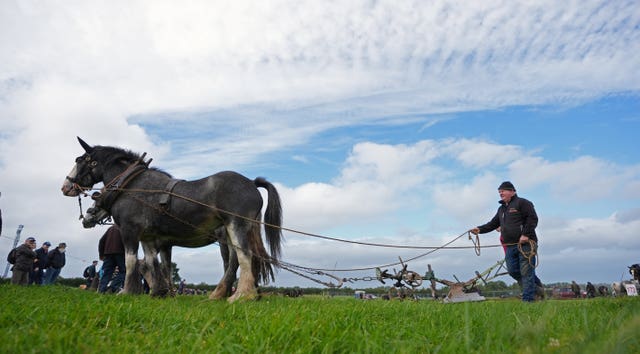
On Wednesday morning at the launch of the rural safety plan, deputy president of the Irish Farmers’ Association (IFA) Alice Doyle said that trespassing had become a “serious” issue.
“On trespassing, that is a huge issue.
“It’s an increasing issue among rural people, particularly among farmers.
“And we’ve had a lot of media coverage of these in recent times.
“We know a lot of people who are suffering from, I suppose, they’ve been intimidated, followed by these trespassers.
“We’ve seen videos on social media, that people have put up; they’ve been intimidated with that.
“But we also have property damage done as a result of them coming in on private property.”
She said animals had also been affected that had been chased by dogs and people who had been trespassing.
“Anybody who has ever been a victim of a dog attack on their animals.
“It’s traumatic to the individual, to the farmers themselves, who have to witness this.
“And I don’t know if anyone here has ever seen it, but if you have, it’s visually in your mind for a very, very long time, and for your family.
“But it’s not only that, but then there’s the financial cost.
“There’s the animal welfare of the animals who are traumatised, and like we’ve seen, particularly sheep crime, where you see dogs who attack sheep, you will see the ewes that have been worried, they may not abort immediately, but they will later on, or the lambs will be born dead or whatever, and they may not even go back in lamb.
“And I don’t think people who have dogs often think about that.
“They often think the dog is a harmless little pet, any dog, I think you have to accept that any dog can attack an animal.”
Assistant Garda Commissioner Paula Hilman, co-chair of the Rural Safety Forum, said the forum helps gardaí to be more “agile” to crime trends.
There are 24 organisations in the rural safety forum, which began in 2019.
“S,o for example, if we see a spate of quads or vehicles being stolen, how do we respond to that?
“During other periods we’ve seen cattle being stolen, so that’s the beauty and the advantage of having our rural crime lead as well, that we will adapt plans to what we see, what crimes are happening, and be responsive.”
Minister of State Niall Collins said there needed to be greater garda “visibility” and accessibility in rural Ireland.
He also said that the National Parks and Wildlife Service deserves credit for “pursuing people who are trespassing on people’s land, who are worrying the sheep, worrying the cattle, attacking the sheep, attacking cattle, but also attacking wildlife and destroying wildlife”.
On food prices, the IFA chief economist Tadhg Buckley said that, while food prices had gone up 5 per cent in the last year compared to inflation of 2 per cent, since August 2010, food prices had risen by 14 per cent while general costs went up by 30 per cent.
“It might feel like we’re paying an awful lot more, when you look at the figure, and you say as a percentage of overall expenditure, it’s still not that high.”
He said his analysis of Eurostat figures indicates that Irish people’s spending on groceries compared to their income still “isn’t that high”, around 8.6 per cent compared to an EU average of 13 per cent as of 2023.
He said the same analysis indicates food prices “went nowhere” and “stayed static” for the best part of 20 years, until 2022.
“So yeah, it feels like it’s gone up an awful lot, but when you look at it over a longer period of time, for what you’re gettin,g I think you’re still getting good value, even though you’re paying a lot more for it.”
